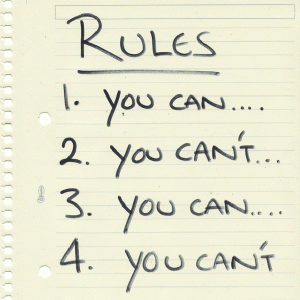 Rules can be problematic. No sooner have you made one than some
loophole appears that you never thought of. A technicality. A weird
application. A four-year-old.
Consider, for example, something as simple as "No cookies before
dinner." Aha! You didn't say WHICH dinner. I ate dinner yesterday. Gimme
a cookie.
Rules can be problematic. No sooner have you made one than some
loophole appears that you never thought of. A technicality. A weird
application. A four-year-old.
Consider, for example, something as simple as "No cookies before
dinner." Aha! You didn't say WHICH dinner. I ate dinner yesterday. Gimme
a cookie.This is a persistent problem in religion. People like rules. It's easier to know where you stand when there are rules. But no sooner does a set of principles harden into rules than the weird applications and technicalities start to crop up. Modern situations and cross-cultural interactions come up against rules that have made sense for generations, and the collision produces some absurd questions. Is a caribou kosher? Can an Amish ride in a car he's not driving? Should Mormons drink Coke? Can a Buddhist use disinfectant wipes?
No religion is immune, and the more detailed the rules are, the more miniscule the questions, and the sillier they look to outsiders. Examples from Orthodox Judaism get trotted out a lot. I imagine newspapers in Tel Aviv frequently carry stories about how one orthodox group or another has addressed a technology-based question about what constitutes "work" on the Sabbath.
In Saudi Arabia, what we hear about are fatwas.
In the West, we associate "fatwa" with "battle cry." We hear of some imam or another "issuing a fatwa against..." fill-in-the-blank. Usually a person or group of people. But that phrasing gets us confused about what a fatwa is. Basically, it's an Islamic legal opinion. A qualified Islamic scholar studies an issue, the Islamic law and principle that applies, and offers an official opinion--a fatwa--on how he (and he alone--Islam is not hierarchical so opinions are not binding) thinks an observant Muslim should deal with the question.
And there are a lot of questions. The model for a Muslim life is Mohammed's, and given that Mohammed lived 1500 years ago, in the desert, there tend to be a lot of questions these days that can't be answered by any ol' amateur just reading the standard canon. As a token of respect, for example, many feel the Qur'an should not be taken into the bathroom. Call it the George Costanza/Barnes & Noble rule. But now we carry books in our phones, including the Qur'an. Am I doing wrong if I take my phone into the bathroom?
Thorny, eh? The conclusion (of the scholar who was asked the question) was no. The reasoning was that Muslims memorize the Qur'an as well, and therefore carry it with them, internalized, all the time, in the same way the data is internalized to the phone. Go in with your brain, go in with the phone. (But while you're in there, could you quit spraying water all over the room?) That conclusion would be referred to as a fatwa. I like titles, so I call it the Potty Fatwa.
I've been seeing a lot of fatwas in the news here lately. If you're curious, you can keep yourself abreast of some of the latest reasoning and conclusions at fatwa-online.com. Most of the fatwas you see there are thoughtful and practical ways to make an individual life more holy, and therefore aren't even slightly newsworthy. And since it's always more fun to talk about what other people are talking about, I'll leave them alone as well. Conversation clusters around the sensational, so let's join in!
 First,what I will call the Infidel Infant Fatwa. Full disclosure: This isn't actually a fatwa. This is not an opinion about what one should do, but a straight-up public law decreeing what you must
do. The thing is, though, that law in Saudi Arabia is based on
religious edict, so the lines get blurred. And it lends itself to such a
nice title, don't you think?
First,what I will call the Infidel Infant Fatwa. Full disclosure: This isn't actually a fatwa. This is not an opinion about what one should do, but a straight-up public law decreeing what you must
do. The thing is, though, that law in Saudi Arabia is based on
religious edict, so the lines get blurred. And it lends itself to such a
nice title, don't you think?This past week the Interior Ministry published a list of 50 given names that may not be given to Saudi children. The list includes names that are affiliated with royalty (e.g., Highness, King, Queen), are blasphemous in some way or another (e.g., Messenger, Prophet), or are foreign. Coincidentally, a number of the banned names are commonly used among the minority Shi'ite Muslims. What a coinkydink.
As for the foreign ones, though, you see where this is headed, right? If I can't name my girl Alice (true), what about Alicia? If not Elaine (true), what about Elena? Let the rule-twisting begin! Linda, Sandy, and Lauren are on the list, too. But that's all. Just those. Which seems like a miss, because there's a boatload of names out there that do a WAY bigger job of tying you to a non-Muslim group. SallyJo, BettySue, and JoEllen, for example, are far more likely to turn up in a congregation breathing fire against Muslims than Lauren is.
So I can't explain the logic of what makes the list, but I can certainly understand the logic of having one. Who, on seeing the jaw-dropping list of baby names given at Madison Memorial Hospital in Idaho, doesn't think "There ought to be a law against this"? (Decide for yourself. I'm especially fond of this blog categorizing the 2010 batch.)
If you're curious, here's the Gulf News article, with the complete list of 50 names.
 Next, I offer the Don't-Boldly-Go Fatwa.
Sorry, kids. All you aspiring astronauts and space-camp nuts. According
to a fatwa issued by the General Authority of Islamic Affairs and
Endowment in the U.A.E., a trip to Mars is prohibited. Relevant parts of
the fatwa say that "Such a one-way journey poses a real risk to life,
and that can never be justified in Islam. There is a possibility that an
individual who travels to Mars may not be able to remain alive there,
and is more vulnerable to death." Both of those.
Next, I offer the Don't-Boldly-Go Fatwa.
Sorry, kids. All you aspiring astronauts and space-camp nuts. According
to a fatwa issued by the General Authority of Islamic Affairs and
Endowment in the U.A.E., a trip to Mars is prohibited. Relevant parts of
the fatwa say that "Such a one-way journey poses a real risk to life,
and that can never be justified in Islam. There is a possibility that an
individual who travels to Mars may not be able to remain alive there,
and is more vulnerable to death." Both of those.Dying in such a mission would net you the same punishment due to those who commit suicide. This was important to clarify, because the council was concerned about Muslims who might want to make the trip to escape divine punishment or avoid having to stand before Allah in judgment. Well, gosh, councilmen, if you're worried about people having those ideas, it would seem that BOTH Islamic and scientific education needed to be cranked up a notch around here.
Don't believe me? Check the Arab News article here.
 Finally, my favorite, the Chuck-a-Rama Fatwa. This comes from a single Saudi cleric, who declared that all-you-can-eat buffets should be prohibited (see the article here). One should know what one is going to eat, he declared, and how much of it, before making the purchase.
Finally, my favorite, the Chuck-a-Rama Fatwa. This comes from a single Saudi cleric, who declared that all-you-can-eat buffets should be prohibited (see the article here). One should know what one is going to eat, he declared, and how much of it, before making the purchase.That explanation leaves me more puzzled than I was before he offered it. The Twitter conversation suggested he had the idea that Muslims might end up stealing from the proprietors, or be robbed by receiving less than they paid for. Maybe he's never been to a buffet, which is all it takes to understand the business model: You pay a low price for a large quantity of poor food. The restaurant owner makes a profit, and the customer rolls away stuffed. Win-win!
When I saw the title of the article, I thought the fatwa was going to explain how the Kingdom's obesity epidemic was un-Islamic and call on citizens to make healthy choices. But it sounds as if it had more to do with the fairness of the transaction, drat it.
OR, you could go the American route, which addresses both. My husband and I once went into a buffet restaurant for breakfast while traveling (before Instagram, unfortunately) and I saw a handwritten sign taped to the cash register at the entry: "Gastric bypass patients must show ID to receive a 10% discount."
Go ahead. Think about it. Think about it some more. The layers of wrongness will multiply and fold over each other more and more the longer you go. Have you reached the "That more-is-better mentality is the real disease you need to cure" layer yet? Clearly, we need to be saved from ourselves. Perhaps a fatwa would be a good idea.
No comments:
Post a Comment